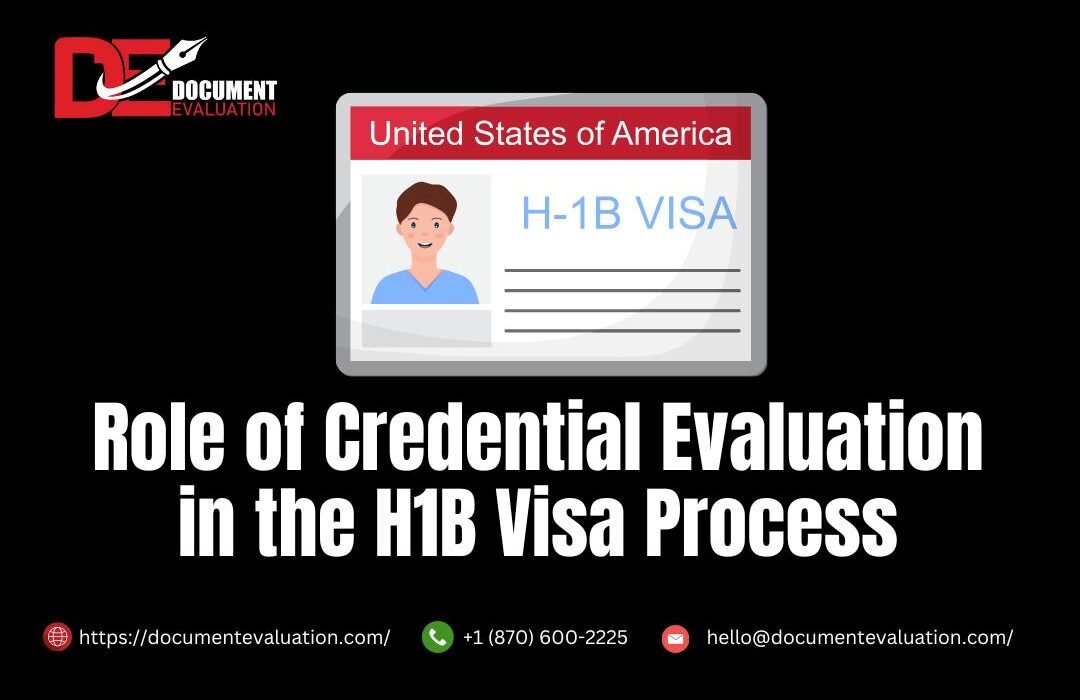Role of Credential Evaluation in the H1B Visa Process
The H1B visa process has become a cornerstone for professionals aspiring to work in the United States. This visa is specifically designed for skilled workers in specialized fields, such as IT, engineering, finance, and healthcare. However, navigating the complexities of the H1B visa application process can be challenging, particularly for applicants with foreign educational qualifications. One of the key elements in this journey is the foreign credential evaluation process. This blog will explore the pivotal role credential evaluation plays in securing an H1B visa in 2025, providing clarity and actionable insights for applicants.
What Is Credential Evaluation?
Credential evaluation is a systematic process that assesses and compares foreign educational qualifications to their U.S. equivalents. For H1B applicants, this involves reviewing degrees, diplomas, and certifications to ensure they meet the educational requirements stipulated by the United States Citizenship and Immigration Services (USCIS).
The purpose of this evaluation is to:
- Verify the authenticity of academic credentials.
- Determine the U.S. equivalence of foreign degrees.
- Bridge educational gaps for eligibility in specialized job roles.
Why Is Credential Evaluation Crucial for the H1B Visa Process?
USCIS has stringent guidelines for H1B visa applicants, especially regarding educational qualifications. Here’s why foreign credential evaluation is indispensable:
1. Meeting Educational Criteria
The H1B visa requires applicants to possess a U.S. bachelor’s degree or its equivalent in a specific field. Credential evaluation ensures your foreign degree matches this requirement, highlighting its equivalence to a U.S. qualification.
2. Overcoming Degree Disparities
Educational systems vary widely across countries. A bachelor’s degree in one country might not align with the U.S. educational framework. Credential evaluators analyze course content, credit hours, and specialization to determine its comparability.
3. Strengthening Visa Petitions
A professionally prepared credential evaluation report adds credibility to your H1B visa petition. It demonstrates that your qualifications have been thoroughly reviewed and meet the standards expected by USCIS.
4. Addressing RFEs (Request for Evidence)
If USCIS finds discrepancies or insufficient information regarding your education, they may issue an RFE. A detailed credential evaluation can preemptively resolve these issues, minimizing delays and increasing the likelihood of approval.
Key Elements in the Credential Evaluation Process
1. Document Collection
Applicants need to provide:
- Copies of degrees, diplomas, or certificates.
- Academic transcripts detailing courses and grades.
- Professional certifications (if applicable).
2. Course-by-Course Evaluation
A detailed analysis of each course, including credit hours and grades, ensures your education aligns with U.S. academic standards.
3. Expert Opinion Letters
In cases where work experience supplements educational qualifications, expert opinion letters are often included to establish equivalency.
4. Accreditation Verification
Credential evaluators verify the accreditation of your institution to ensure its recognition by U.S. standards.
How to Choose a Credential Evaluation Service
Selecting the best credential evaluation agency is critical for a smooth H1B visa application process. Here are factors to consider:
1. Accreditation and Affiliations
Choose an agency recognized by professional organizations such as NACES or AICE. These affiliations ensure credibility and adherence to high standards.
2. Experience in H1B Cases
Opt for a service provider with expertise in handling H1B-related evaluations. Agencies with experience in immigration cases understand USCIS requirements and can provide tailored reports.
3. Turnaround Time
Time is of the essence in visa applications. Look for agencies offering expedited services without compromising accuracy.
4. Comprehensive Support
Some agencies, like Document Evaluation, offer additional support such as expert opinion letters and assistance in responding to RFEs, making them a one-stop solution for H1B applicants.
Benefits of Credential Evaluation for H1B Applicants
1. Increased Approval Chances
A thorough credential evaluation ensures your application meets USCIS standards, reducing the likelihood of rejections or RFEs.
2. Clarity for Employers
Credential evaluation helps U.S. employers understand the value of your foreign education, giving them confidence in your qualifications.
3. Simplified Immigration Process
By addressing educational equivalency issues upfront, credential evaluation streamlines the H1B visa application process.
Credential Evaluation in 2025: Trends and Insights
As we step into 2025, the demand for H1B visas continues to grow. Here are some trends shaping credential evaluation in the H1B process:
- Increased Digitalization: Online credential evaluation services are becoming more prevalent, offering quicker and more efficient solutions.
- Focus on Specialized Degrees: With a growing emphasis on STEM fields, credential evaluations are adapting to highlight specialized qualifications.
- Enhanced RFE Preparedness: Agencies are providing more comprehensive reports to preempt RFEs, ensuring smoother application processes.
How Document Evaluation Can Help
Document Evaluation is a trusted name in the credential evaluation industry. Our services are designed to simplify the H1B visa process for international applicants. Here’s what we offer:
- Accurate Evaluations: Our detailed reports ensure your foreign degree meets U.S. standards.
- Expert Opinion Letters: Strengthen your application with professional endorsements.
- RFE Assistance: We provide tailored solutions to address USCIS concerns.
- Fast Turnaround: Our expedited services ensure timely submissions.
Conclusion
Credential evaluation is a critical component of the H1B visa application process. By ensuring your foreign qualifications align with U.S. standards, it enhances your chances of securing this coveted visa. Whether you’re applying for the first time or addressing an RFE, a reliable credential evaluation service can make all the difference.
If you’re preparing for your H1B application in 2025, don’t overlook the importance of foreign credential evaluation. Partner with a trusted agency like Document Evaluation to pave the way for a successful career in the United States.







